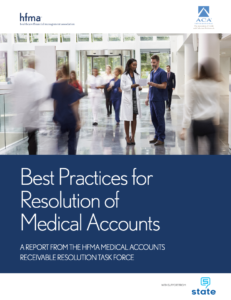State Collaborates with HFMA and ACA International to Create Medical Accounts Receivable Resolution Best Practices

The Healthcare Financial Management Association (HFMA) recently published voluntary best practices for the fair resolution of patients’ medical bills. The best practices are designed for use by healthcare providers, providers’ business affiliates and credit bureaus. Jointly published with the Association for Credit and Collection Professionals (ACA International), the 28-page report updates and extends guidance that was originally published by HFMA in 2014. The report emphasizes the importance of educating patients and ensuring that they understand the account resolution process.
“Education and engagement are important throughout a patient’s financial experience,” said HFMA President and CEO Joseph J. Fifer, FHFMA, CPA. “Transparency is important not only for price information but also with regard to financial assistance policies, identifying sources of coverage, and payment options. These best practices provide concrete, specific guidance to help healthcare finance professionals operationalize that level of transparency.”
The report includes best practices for modifying financial assistance policies in response to the COVID-19 pandemic and recommended safeguards to implement before initiating actions, such as credit bureau reporting, that some hospitals and their business affiliates may elect to pursue, in accordance with account resolution policies that have been approved by the hospital’s board of directors or other authorized body.
“ACA members have been working with consumers over the past several months to help them understand their options and provide solutions to financial challenges,” said ACA International CEO Mark Neeb. “We greatly appreciate the collaboration with HFMA and the other partners to develop best practices for fair resolution of medical debts that document ACA members’ compassionate approach and their commitment to continue serving consumers throughout the COVID-19 crisis and beyond.”
The report maps out the entire medical accounts receivable resolution process from preservice to post-discharge, incorporating elements from HFMA’s Patient Financial Communications Best Practices and Patient Friendly Billing initiative. It details financial assistance policy communication requirements for not-for-profit hospitals, which the task force recommends all hospitals should follow, regardless of tax-exempt status. A section on frequently asked questions addresses basics of the account resolution process, working with account resolution business affiliates, steps to take when initiating certain collection actions and final disposition of unresolved accounts. Appendixes include a sample public health emergency financial assistance policy, relevant legal provisions, a glossary of terms and sample consent language.
The report was developed with the support of State Collection Service.
“The creation of best practices will enable healthcare providers, their business partners and patients to work collaboratively, in a consistent manner, to resolve outstanding accounts,” said Tim Haag, president of State. “Our goal is to provide empathetic, knowledgeable assistance to both providers and patients by offering all possible solutions in account resolution.”
Members of HFMA’s 2020 Medical Accounts Receivable Resolution Task Force include a diverse group of providers, consumer advocates and collection agencies.
The report is available at.
A podcast discussing the report can be downloaded at: https://conta.cc/3n1xmyh